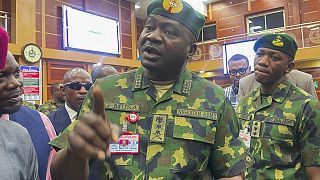Nigeria
Nigeria's military claimed on Thursday that Abu Musab al-Barnawi, the leader of an Islamic State-linked extremist group blamed for killing hundreds in the northeast, has died.
There was no immediate confirmation from the militants.
General Lucky Irabor, Nigerian Chief of Defense Staff, told reporters that Al-Barnawi "remains dead," without giving details into the circumstances that led to his demise.
It was not possible to independently corroborate the claim and the military gave no further details about how it knew he had been killed.
Al-Barnawi's father, Mohammed Yusuf, had been the founding leader of Boko Haram, the Islamic extremist group that has been carrying out an insurgency for more than a decade now.
The violence has spread to neighboring Niger, Cameroon and Chad as well, destabilizing the Lake Chad region.
Al-Barnawi frequently clashed with the man who replaced his father, Abubakar Shekau, and broke away in 2016 to form the Islamic State in West Africa Province or ISWAP.
Concern has mounted about ISWAP in recent years especially when the group began targeting civilians working for international aid organizations in the northeast.
The faction led by Shekau had appeared weakened and in May it was announced that he had been killed during clashes with fighters linked to Al-Barnawi.
Security analysts say that Al-Barnawi, however, had failed to win over thousands of Boko Haram members who had been loyal to Shekau and many surrendered to the Nigerian military instead.
Unlike Boko Haram, which often violently targeted civilian populations, ISWAP under al-Barnawi targeted the Nigerian military and those who aided the soldiers.
At the presser, Irabor added that insecurity as other threats especially in the north of the country "are not confined to boundaries" and said the Nigerian government works closely with its neighboring countries in the fight against terrorism and other forms of criminality.
"If all is well in our home and is not well with our neighbor, then, of course, we can't have peace" he added.
The conflict in Nigeria has directly caused the death of 36,000 people, according to U.N, officials, with more than 2.3 million people displaced.











02:22
Cameroonian marine conservationists trained as scientific divers
00:52
Nigeria’s Peter Obi to contest 2027 election, opposition coalition in jeopardy
01:49
Sudanese refugees in Chad face deepening humanitarian crisis
Go to video
Alliance of Sahel States puts on show of unity through inaugural games
11:15
AI drones lead breakthrough against malaria in Africa [Business Africa]
01:00
Detained Chadian opposition leader Succes Masra begins hunger strike